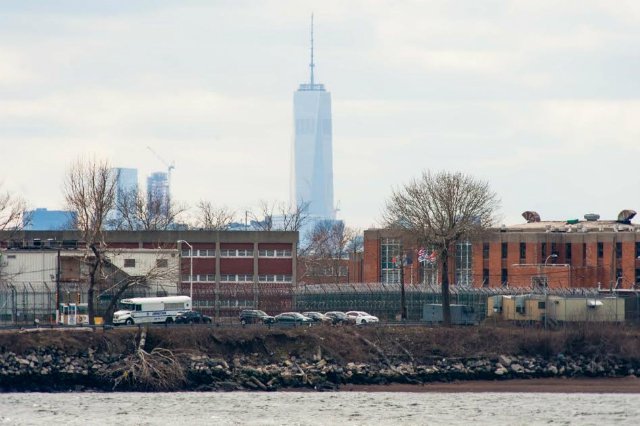'We Are Owed Much More Than A Concept': Hearing On NYC's New Jails Plan Draws Protests
July 10, 2019, 5:18 p.m.
The plan to build new jails has faced mounting pushback from communities even as the call to close Rikers, which has a long history of violence and abuse, have grown more urgent.

Rikers Island
The de Blasio administration’s $9 billion plan to shut down Rikers Island, the city’s main jail complex, and replace it with four borough-based jails drew angry protests and jeers during a more than six-hour-long public hearing on Wednesday before the Planning Commission.
The new jails have faced mounting pushback from communities even as the call to close Rikers, which has a long history of violence and abuse, have grown more urgent with the recent death of 27-year-old transgender woman Layleen Polanco.
Rona Love, a prison reform and LGBTQ activist who said she suffered from trauma after being held in prison for 30 years, was one of several formerly incarcerated individuals who urged the city to invest in health services and housing rather than new jails.
“That’s where the money should be,” she told the commission.
She then choked up, adding, “Layleen should have never died.”
Members of No New Jails NYC, a group of activists who argue that all jails are inherently inhumane and the city should not be building new ones, also packed the hearing. Rather than wait on a replacement plan to be approved, they have called on the city to close Rikers immediately.
Protestors erupt into chants of "No new jails" pic.twitter.com/kETjLTGEYt
— Caroline Spivack (@CarolineSpivack) July 10, 2019
Advocates for the mayor's plan say it's necessary to reduce the time and cost of transporting inmates to court appearances as well as make it easier for families and lawyers to visit. With the exception of the Bronx, all of the new jails would be built at existing detention centers and near court houses. Each would hold fewer than 1,440 inmates, according to City Hall.
So far, every community board whose district would encompass a new jail has voted down the plan. Among the many objections is the scale of the buildings, which could rise to around 40 stories.
“There is no proposed design and rationale why such a large building is needed,” said Manhattan Borough President Gale Brewer, during the hearing, about the plan to build a new jail in Chinatown.
Brewer, who along with Brooklyn Borough President Eric Adams has endorsed the mayor’s proposal, nonetheless spelled out a long list of concerns. She said the public still needed to know more details on the plan and design of the building, including what steps the city would take to mitigate the effects on construction.
“We are owed much more than a concept before the plan is approved,” she said, dismissing the city's renderings as insufficient.
Bronx Borough President Ruben Diaz Jr. has fought against the city’s proposal for its selection of Mott Haven as a new jail site, saying that the project will place an unfair burden on a poor, minority neighborhood.
“Instead of reaching out to the community, the administration has decided to impose a monolithic, oppressive structure adjacent to a community of reclaimed apartments, homes and schools, in the name of political expediency,” Diaz said in a statement that was read before the Planning Commission.
George Janes, an urban planner who was among the roughly 100 people who signed up to testify at the hearing, agreed.
“The location in Mott Haven is foolish, shortsighted, and expedient,” he said. “Expedient is not how we should make decisions.”
Diaz and other community members have put forth an alternative plan, which would involve rebuilding the existing Bronx Family Court and developing an adjacent vacant space next to the Bronx Hall of Justice on East 161st Street for a combined courthouse and detention facility.
The Planning Commission, which has 60 days to vote on the application, is the penultimate step in the approval process before it goes to the City Council for a final vote.